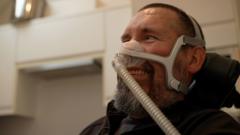
The UK is currently debating a landmark bill that would legalize assisted dying for terminally ill patients expected to die within six months. The proposed legislation has sparked intense discussion, with politicians from both major parties divided on the issue.
The bill, introduced by Labour MP Kim Leadbeater, would allow terminally ill patients to choose to end their lives, provided their decision is approved by doctors and meets strict safeguards. Prime Minister Sir Keir Starmer has promised that Labour MPs will be allowed to vote with their conscience.
The article highlights two personal perspectives from individuals with terminal conditions: Nik Ward, who opposes the bill, and Elise Burns, who supports it.
Nik Ward, 53, has motor neurone disease and has been told he is terminally ill for the past five years. Despite initially believing he would have chosen assisted dying three years ago, he now appreciates life and fears the bill could pressure vulnerable people into ending their lives prematurely. He worries that thoughtful, considerate individuals might feel obligated to die to avoid being a burden to their families.
Elise Burns, 50, is battling terminal breast cancer that has spread to her bones, lungs, and liver. She lives with constant, intense pain, relying on multiple pain medications. Burns is passionate about the assisted dying bill, believing it would provide terminally ill patients with a compassionate choice. She argues that the six-month limitation and required medical and judicial approvals would prevent coercion.
Critics of the bill are concerned about potential implicit pressures on vulnerable patients. Some fear that the mere existence of such legislation could create subtle psychological expectations for terminally ill individuals to consider ending their lives.
The proposed safeguards include:
– Availability only to patients expected to die within six months
– Approval required from two doctors
– Judicial review of the request
– Ensuring the patient’s decision is made without external pressure
Burns plans to use Dignitas, a Swiss assisted dying service, which would cost her between £12,000-£15,000. She argues that the current system disadvantages those who cannot afford such expensive alternatives.
While acknowledging the complexity of the issue, both Ward and Burns represent the nuanced perspectives surrounding assisted dying. Ward recognizes his relatively privileged situation without constant pain, while Burns emphasizes the importance of personal choice in end-of-life decisions.
The bill remains controversial, with supporters seeing it as a compassionate option for those facing terminal illness, and opponents worried about potential ethical and practical complications. The debate reflects the deeply personal and complex nature of end-of-life choices, highlighting the need for careful consideration of individual circumstances and robust safeguards.







